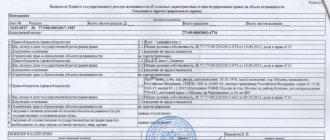The inheritance process is a type of legal relationship that arises during the transfer of the personal property of a deceased citizen into the ownership of his heirs. Art. 1112 ch. 61 of the Civil Code of the Russian Federation defines the composition of inheritance as “things, other property”, the owner of which must be an adult and capable citizen.
Registration of a share when inheriting a cooperative apartment also goes through the inheritance procedure and is somewhat different from standard operations associated with receiving property. For the inheritance of a cooperative apartment, there is a special legal algorithm that determines the procedure for the future owner.
Is it possible to register an inheritance for a share in an apartment?
The construction of a residential building can be carried out by a cooperative, whose members have the right to claim housing, since they own a share. A share is a part of cooperative property, reflecting the individual share of participation of each member in the cooperative (Article 1 N 193-FZ). This share consists of an initial contribution that each member of the cooperative makes upon joining. The contribution is accepted in the form of cash, land plots and other property that has an appropriate monetary value.
The contributed share becomes a form of ownership of the cooperative participant and gives the right to claim housing. To formalize this right, the participant must fully pay the cost of the apartment, after which he can legally formalize ownership.
After the death of the testator, the share, like other property, can be transferred to the heir, in some cases simultaneously with the right to join the cooperative. The right to join a cooperative, according to Article 8 No. 190-FZ “On Credit Cooperation,” is determined by its charter.
Are heirs required to join a cooperative?
Membership in any association is voluntary. No one can force citizens to join a cooperative.
But there are some nuances. It all depends on whether the testator managed to pay the cost of housing and register ownership.
The obligation to join a cooperative arises in the following cases:
- The shareholder did not have time to pay the full cost of the apartment. The applicant will have to apply to join the housing cooperative, and after being accepted into the association, make payments. Otherwise, the recipient is deprived of the right to inherit the apartment.
- If the shareholder has paid the full cost of the apartment, but has not registered ownership of it, then the recipient will have to become a member of the association. The apartment is the property of the cooperative. Only members of the housing cooperative can live in it.
Important! If the cost of housing has been paid in full and the testator has completed all the paperwork, then it is not necessary to become a member of the cooperative.
Who has a priority right to membership in the housing cooperative? Priority is given to the spouse of the testator. The only condition is that she must have the right to a share.
If the spouse did not participate in payments or refused membership in the housing cooperative, then the preemptive right passes to the heir who lived with the deceased subject. If the priority applicants refuse or are absent, then the right to membership in the association passes to the heir who lived separately from the deceased citizen.
What types of cooperatives are there?
Article 1 of the Federal Law “On Production Cooperatives” defines the concept of a production cooperative as a voluntary association of citizens for organizing economic activities using the personal labor participation of its members. Production cooperatives are commercial organizations that involve direct personal participation in the activities of the organization. Their subject of activity is production, trade, provision of services and other areas of a commercial nature.
Article 1 of the Law “On Consumer Cooperation” indicates that a consumer cooperative is created to satisfy the material or other needs of its members. They are not obliged to take part in the work, although cooperative payments are distributed among them in accordance with the degree of participation in economic activity.
Consumer cooperatives are divided into several types:
- Agricultural - there are farming, gardening, etc.
- Housing - formed for the construction or purchase of housing, there are garages, country houses.
- Credit - work is organized through making cash contributions to the general treasury with the expectation of the possibility of receiving financial assistance after some time.
Rights of heirs to a share in the apartment
In accordance with Art. 124 of the Housing Code of the Russian Federation, a cooperative participant receives residential premises in the houses of a housing cooperative on the basis of a general decision of the members of the cooperative. However, until the share payment for the received housing is fully paid, a member of the cooperative cannot register ownership of it.
After the death of the owner, cooperative real estate can be inherited like any other, but this process has some peculiarities. Thus, inheritance of a cooperative apartment is possible if ownership of the property was registered during life. It arises only after the share has been fully paid, which is determined by Art. 30 Federal Law “On Housing Savings Cooperatives”. Until this moment, the owner can live in the allocated area, but is not able to dispose of it, that is, donate, sell, or inherit it.
The right of ownership forms the right of inheritance, which arises when share contributions are fully paid to the consumer cooperative that owns the apartment. This provision is also spelled out in Art. 218, part 4 of the Civil Code of the Russian Federation.
Ownership of a cooperative apartment
Is cooperative housing subject to inheritance? The inherited property includes objects that belong to the testator by right of ownership (Article 1112 of the Civil Code of the Russian Federation).
A citizen acquires ownership rights to a cooperative apartment after meeting the following conditions:
- making all share contributions;
- registration of documents on ownership of housing.
Expert opinion
Stanislav Evseev
Lawyer. Experience 12 years. Specialization: civil, family, inheritance law.
If the testator did not have time to pay for housing or draw up title documents, then accepting the inheritance will be accompanied by certain restrictions. The user of cooperative housing becomes the owner of the property after paying the share. The housing cooperative issues the shareholder a corresponding certificate. After which the copyright holder can register ownership. The supporting document is an extract from the Unified State Register.
If the shareholder has made only part of the payments, then he cannot register ownership. Accordingly, a citizen has no right to dispose of such an apartment, including to make a will.
If the share is paid
Making the last payment for an apartment to the housing cooperative is the basis for registering ownership. The user becomes the actual owner of the property.
However, until the object is registered with the state, he cannot fully dispose of the property. Ownership must be confirmed by an extract from the state register.
What to do if the shareholder did not have time to complete documents for housing? The property is included in the inheritance. However, the heirs will have to go to court.
Example. Citizen N. filed a lawsuit. She asked to include the property in the inheritance. The defendant was the housing cooperative. The circumstances of the case - the plaintiff and her husband were members of a cooperative. During their marriage, they fully paid off the cost of housing. The late husband was a member of the cooperative. A certificate of payment for the cost of housing was issued in his name. After the death of the testator, an inheritance in the form of an apartment was opened. The plaintiff continues to live in it and pay utilities. In addition to the plaintiff, there are two more heirs (daughter and son). Within the established time frame, the applicants turned to the notary. However, the notary refused to issue them a certificate. The reason is that the apartment is not registered with the BTI; the certificate indicates the old name of the Kuibyshev region. The absence of a title document prevents entry into inheritance. The court granted the claim (Decision of the Komsomolsky District Court of Togliatti dated August 29, 2012 No. 2-1517/2012).
After the completion of the trial, the heir will have to contact the notary again. Based on the court decision, the notary will have to issue a certificate. After which the copyright holder will be able to contact Rosreestr and register ownership.
What to do if the cooperative was liquidated? Here things are a little different. The beneficiary will have to go to court with a corresponding claim.
Example. Ivanova S.A. and Ivanova L.V. went to court. The plaintiffs asked to recognize ownership of the property. The defendants are the Municipal Administration and N.S. Ivanov. The circumstances of the case are that the plaintiff became a member of the housing cooperative by decision of the executive authority. He was allocated the disputed apartment. The plaintiff and his family moved in on the basis of a warrant. The cost of housing was paid in full. However, the supporting document has not survived. At the time of filing the claim, the housing cooperative ceased to exist. The plaintiff lost the opportunity to register property rights. The applicant has been using the apartment openly for 18 years. In court, the information about the liquidation of the housing cooperative was confirmed. The reason for the liquidation of the association is the presence of signs of an inactive business entity. A request to the archive did not produce results. The cooperative did not hand over the documents for storage. The disputed housing is not municipal property. The claims were satisfied (Decision of the Venevsky District Court of the Tula Region dated June 25, 2012).
After the completion of the legal process to establish ownership rights, the heir does not need to go to the notary. The basis for registering property rights is a court decision. The applicant can immediately prepare a package of documents and submit them to Rosreestr.
Can a cooperative refuse to provide housing by refunding the amount of the paid share? Such actions are considered illegal.
If the testator has paid the full price of the apartment, then even untimely registration of property rights does not give the cooperative the right to forcibly seize the housing. The rights to the property pass to the heirs of the deceased shareholder.
If the share is not fully paid
Acceptance of cooperative property as an inheritance depends on two factors - full payment of the cost of housing (payment of shares) and execution of title papers.
If the shareholder did not manage to pay the cost of the apartment, then the heir will have to join the housing cooperative and continue to make monthly payments. Claimants to property who lived with the testator may continue to use the property.
If the recipients lived separately from the testator, they can receive the amount paid to him. Then the apartment will remain in the ownership of the cooperative.
How to find out the amount paid for an apartment? The heir can obtain the necessary information from the board of the housing cooperative.
How is a cooperative apartment divided between heirs?
Chapter 62 and Chapter 63 of the Civil Code of the Russian Federation determine that there are two types of inheritance, which are also typical for cooperative real estate: by law and by will. Art. 1111 of the Civil Code of the Russian Federation indicates that inheritance by law occurs in cases where there is no will. When dividing an inherited apartment, the first thing to check is the presence of the owner’s will document.
According to the law, inheritance recipients are formed depending on the degree of closeness with the deceased. Art. 1142-1144 of the Civil Code of the Russian Federation determine that parents, spouses, and children are considered heirs of the first priority. Next come brothers, sisters, grandparents, and then uncles and aunts. The inherited property within which the share is considered is divided into equal shares between the heirs of the first priority.
Disabled parents, disabled spouses and disabled children are required to receive a share, regardless of the method of transferring the inheritance (Article 1149 of the Civil Code of the Russian Federation).
If there are no first-line applicants, the transfer of inheritance passes to another circle of relatives who are on the second-line lists. Under a will, the rights and order of successors are determined by a document drawn up by the owner of the property during his lifetime. The will describes the circle of persons who can claim to receive the testator's property.
Moreover, if the share payment for the apartment was not fully paid, but funds were received by the housing cooperative, the heirs of the cooperative apartment receive monetary compensation. The procedure for this process is determined by the charter of the cooperative, which is established in Art. 14 of the Law of the Russian Federation “On Consumer Cooperation”.
In addition, the spouse of the deceased acquires a special position in this case. If he or she has participated in payments since joining the cooperative, then it becomes possible to claim half of the cooperative real estate. Only the remaining portion will be divided among the remaining heirs. If the spouse participated in the payments, but part of them was paid before the marriage, he can claim half of the money contributed. Also, according to Art. 131 of the Housing Code of the Russian Federation, he is assigned the pre-emptive right to join the cooperative.
Rules of ownership and residence
The owner of a cooperative apartment is considered to be the shareholder himself, registered as a member of the cooperative. Members of his family do not have property rights, even if they live under the same roof and participated in the payment of contributions. If we are talking about cooperative housing that has become the property of spouses living in an officially registered marriage at the time of joining the housing cooperative, then when dividing the property, such an apartment is recognized as joint property and is divided in equal shares between both spouses.
If part of the money for the property was paid before marriage, then when calculating the size of the share, the specified amount is deducted from the part belonging to the spouse who was not involved in this payment.
Minor children have the right to live in a cooperative apartment for as long as necessary. It is impossible to evict them from this living space. A member of a cooperative can transfer his right to a share to one of the adult members of his family, but only after drawing up the appropriate documents. If one of the spouses is a co-owner of the transferred share, then the permission of the other is required.
The official transfer of the share is carried out after receiving the Protocol on the decision of the general meeting. In addition, the owner of the share has the right to exchange it for equivalent housing located in the same building as the desired apartment. Also, a cooperative apartment can be exchanged for a state-owned one, even if it is located in different localities.
To carry out the exchange procedure, written permission from all persons living in the apartment is required.
Documents for inheriting a cooperative share
Registration of inheritance of a cooperative apartment occurs through an application to a notary. To do this you need to provide the following documents:
- Passport.
- Grounds for receiving inheritance. In the absence of a will, you need to prepare documents confirming family relationships: birth certificates, marriage certificates, etc.
- Death certificate of the owner.
- Extract from the Unified State Register of Real Estate.
- Agreement of the deceased owner to join the cooperative.
- Certificate of payment of share.
- Cadastral passport of the object.
If the deceased has made a will, the property specified there goes to the persons named in the document. These can be either relatives or other unrelated recipients. In the absence of a will, the cooperative apartment is inherited by close relatives, who need to confirm their position by presenting the relevant documents on kinship.
Applications for accepting an inheritance and issuing a certificate of inheritance can be found here.
Applications for accepting an inheritance and issuing a certificate of the right to inheritance under a will can be found here.
Housing construction cooperatives (HBC)
Modern housing cooperatives are a completely different matter. They differ significantly from Soviet cooperatives, and they can hardly be called a continuation of the Soviet scheme for raising funds.
Housing cooperative is a non-profit organization that unites its members to purchase housing on the basis of monetary shares. Housing cooperatives still exist as a form of management of an apartment building. The composition of the housing cooperative may include any persons. The construction of the apartment building is being carried out using the available money of shareholders. Housing cooperatives can issue commercial loans for development.
Read about the latest changes in the direct management of an apartment building in this article >>
Risks
Purchasing an apartment under construction using cash shares from a housing cooperative is a rather risky undertaking. This is due to the fact that the state does not protect the rights of participants in such construction. Poor quality construction or long-term construction is the responsibility of the shareholder.
The state protects construction under another scheme - equity participation under Federal Law No. 214-FZ of December 30, 2004. Purchasing apartments being built under this law is a much more reliable way of investing. Shareholders are practically insured against loss of money and non-receipt of housing.
An apartment in an apartment building being built by a housing cooperative costs significantly less than an apartment in an apartment building, the construction of which is being carried out according to No. 214-FZ, and the risk of not getting it is much higher. Let's look at the features of constructing an apartment building using the share contribution system:
- Legislative regulation – the charter of the organization and the provisions of the agreement, chapters 11 and 12 of the Housing Code of the Russian Federation.
- Registration with Rosreestr is carried out only upon completion of construction; the contract is not registered.
- The price for an apartment may rise during the construction process, unless otherwise stated in the contract.
- There is no liability for failure to meet deadlines unless otherwise provided in the contract.
- Share contributions can be paid after construction is completed.
Before concluding an agreement with a housing cooperative for the purchase of an apartment, you should carefully study the permitting documentation for the construction of the facility and find out whose ownership the land plot is.
It is theoretically possible that an apartment building, even after registration of ownership of the apartments in it, will be recognized as self-development. Although the likelihood of such a development is small.
How to register ownership of a housing cooperative apartment
Until the full amount of the cost of the apartment is paid, it is the property of the housing cooperative. A certificate of payment of a share is the basis for state registration of rights in Rosreestr.
Selling an apartment to housing cooperatives
Once the right to an apartment is registered, you can dispose of it at your own discretion: sell it on the basis of a regular purchase and sale agreement, donate it, exchange it. From the moment the house is put into operation and ownership is registered, housing cooperative apartments are no different from other apartments in terms of exercising the right to own, use and dispose of such property.
Read: Methods and features of exchanging shares in apartments between relatives
How to inherit a cooperative apartment?
Art. 1153 of the Civil Code of the Russian Federation determines that the registration of an inheritance must occur within six months from the date of death of the testator. Heirs of a cooperative apartment must obtain a certificate of inheritance.
The registration process is as follows:
- Obtaining a death certificate by contacting the registry office.
- Contacting a notary. The heir must choose a notary office at the last place of residence of the deceased. In the absence of information about it, Art. 1115 of the Civil Code of the Russian Federation determines the need to contact a notary who is in charge of the area where the property is located.
- Transfer of a will confirming the ability to claim an inheritance.
- Drawing up an application.
- Collection of the main package of documents.
- Payment of state duty.
- Obtaining a certificate of inheritance.
- Registration of real estate in Rosreestr.
How does inheritance of a municipal apartment occur?
Residents can use the apartment under the terms of a social tenancy agreement. It is better to inherit municipal housing by will. The Civil Code reserves for a citizen the opportunity to inherit property that he may acquire in the future. In this case, he could privatize a state (municipal) apartment.
Re-registration
Attention! After the death of the tenant, the apartment is still owned by the state or the housing stock. But any member of the deceased’s family can renew the social tenancy agreement under the same conditions. Important conditions are legal capacity and reaching the age of majority.
The contract can be reissued in the regional authorities, which are authorized to manage the relevant housing stock. These are departments and housing committees.
Before contacting this authority, the applicant must:
- remove the former employer from registration;
- collect a package of documents for re-registration.
Important! After re-registration of the social tenancy agreement, the new tenant can privatize the apartment for himself.
All residents of a municipal apartment must give written consent to a change of tenant. They must sign the new agreement. If a citizen cannot appear in person, then he must certify his consent to the new terms of the contract with a notary.
Documents for re-registration:
- passports of all registered residents;
- death certificate of the former employer;
- current contract;
- an extract from the house register, a certificate with information on the personal account of the former tenant.
Already on the basis of the new agreement, the management organization makes changes to the personal account for the living space.
When agreement is not reached between relatives on whom to draw up a rental agreement, you can go to court.
Privatization based on the principle of inheritance
Inheritance of non-privatized housing is unacceptable by law. But after the death of the former owner, his relatives can re-register the property in their name. If before his death the testator managed to express his right to privatize the housing, then the heirs can go to court to implement this expression of will on the principle of inheritance.
The possibility of a deceased citizen to obtain property rights is recognized in court. After which this object is included in the inheritance mass and distributed among the heirs on a general basis.
How to register an apartment share by inheritance without a will?
When registering an inheritance according to the law, that is, without a will, the procedure for the heirs of the cooperative apartment will be as follows:
- Obtain a death certificate.
- Contact a notary at the place of residence of the deceased or at the location of the property if the last place of residence is unknown.
- Provide the necessary documents for registration of inheritance, including certificates confirming the fact of relationship with the deceased. These may include a birth certificate, marriage certificate, or adoption certificate.
- Submit an application to initiate the opening of a case, along with other documents.
- Receive a certificate of inheritance 6 months after the death of the testator.
- You can register property in Rosreestr, this can be done through the MFC.
How to register an apartment share by inheritance if there is a will?
If there is a will, everyone named in the document can apply for an apartment share. Art. 125 of the RF Housing Code determines that a share can belong to one or more citizens. Registration occurs in the following order:
- Obtaining a death certificate of the testator.
- Visit to a notary with a passport, death certificate and will.
- Filling out an application for acceptance of inheritance under a will.
- Collection of documents.
- Waiting for 6 months.
- Obtaining a certificate of inheritance.
- Registration of property in Rosreestr through the MFC.
Inheritance of a cooperative apartment if contributions are not paid
If payments for a cooperative apartment during the life of the deceased were not fully made, there are two options for the development of events:
- The housing is transferred to the cooperative. Early payments made are transferred to the heirs of the deceased. This happens if the heirs did not live with the testator on the territory of the cooperative apartment.
- Housing is registered as the property of citizens. This is possible in cases where close relatives who become heirs lived together with the testator, thanks to which they can now continue to use the cooperative apartment. To register your home ownership, you must join the cooperative and continue making payments.
If the share was paid out earlier, the heir may not join the cooperative in order to receive ownership of the property.
What to do if the testator took part in a consumer cooperative?
Inheritance of rights associated with participation in a consumer cooperative occurs in a slightly different established manner. In this case, the heir gets the opportunity to join the cooperative and receive all the relevant rights. They cannot refuse him entry. If there are several heirs, then one person joins the cooperative. Who will become a participant is determined in the following ways:
- Through a voluntary agreement between heirs;
- Through the court.
If no heir has joined the cooperative, all persons must be paid from the testator's share in an amount corresponding to the size of their shares. Compensation is paid in accordance with the provisions of the community charter.
If there is a cooperative apartment, the heirs, in any case, receive part of the inheritance. If the share is not paid in full, payments from the paid part are sent to them. The property remains the property of the cooperative. If it is paid, then you can get all the rights to housing.
Inheritance of a cooperative apartment if the share is paid
From a legal point of view, a cooperative apartment in which a share has been paid is practically no different from ordinary real estate. Its registration also occurs in accordance with the will or is determined by law in the absence of a will document.
If a member of the cooperative paid his dues, but died before receiving a document confirming ownership, the cooperative apartment is still registered with him. In such situations, the certificate is received by the heir, who must first prove that the share has been fully paid.
If the successor lived with the testator in the same apartment and continues to use it, the property is defined as actually accepted.
Terms and cost of registration
The process of inheriting a cooperative apartment is similar to accepting ordinary property left after the death of a relative. Art. 1154 of the Civil Code of the Russian Federation determines that a period of 6 months is given for accepting an inheritance, calculated from the date of death of the owner of the property. If the successor applies later than the deadline, the notary cannot accept his application. At the same time, the case of opening an inheritance itself is opened on the day when the death of the owner was recorded. Within the specified time, the successor must do the following:
- Contact a notary to submit an application.
- Collect documents required to register property.
- Obtain a certificate of inheritance.
Each heir can sell a share, donate it, or bequeath it if the other co-owners agree.
The cost of registering the inheritance of a cooperative apartment is determined by Art. 333.24 of the Tax Code of the Russian Federation, indicating the following amounts of state duty:
- For close relatives, which include children, spouses, parents, brothers and sisters - 0.3% of the cadastral value of the property. In this case, the state duty cannot exceed 100,000 rubles.
- For other successors - 0.6% of the value of the property. In this case, the amount does not exceed 1,000,000 rubles.
Art. 333.38 of the Tax Code of the Russian Federation indicates that there are special categories of citizens who are exempt from paying state duty. These include:
- Citizens living together with the testator until his death.
- Heirs of employees who died while fulfilling government obligations.
- Heirs of victims of political repression.
- Minors or incompetent.
Registration of an apartment share through the court
Sometimes registering an inheritance of a cooperative apartment may be associated with legal problems, the solution of which can only be achieved through the court. A common reason for this practice is property disputes arising between the successors of the testator. This can happen if several family members apply for an apartment at once.
There are two ways to resolve property disputes:
- Redemption of all shares by one heir with the consent of the remaining owners.
- Sale of property and distribution of the received amount according to the share of each successor.
In the absence of a settlement agreement, the legal successors need to prepare a claim for division of property.
Heirs can also go to court due to other circumstances. For example, this is the only way to restore the ability to file an inheritance application if the deadline is missed. A positive verdict against a successor is issued only if there are exceptional circumstances that prevented him from contacting a notary in a timely manner.
Registration of an apartment share through the court occurs in the following order:
- Attending court and writing a statement of claim.
- Collection of documents. Depending on the reason, it should include documents such as an application to summon witnesses to court, a certificate from a notary refusing to issue a certificate of inheritance, a certificate confirming the valid reason why the successor missed the deadline allotted by law.
- Consideration of the application in court.
- Registration of property rights by court decision.
Registration of inheritance rights to an apartment share
To register inheritance rights, you need a profile document confirming the fact of a change in the legal status of a citizen. Such a document becomes a certificate of the right to inheritance, which is issued if the deadlines for the legal registration of the inheritance and the availability of contributions to the cooperative apartment are met in a timely manner.
If the share includes real estate, it must be registered using a title document. With this, you need to contact Rosreestr through the MFC, transferring the property from one owner to another.
Apartment features
In order to decide on the topic of ownership of a cooperative apartment, every “teapot” should know what the term “cooperative” is.
In order to build an ordinary residential building, an organization “cooperative” is created - the activity of several legally capable persons. Since building a house is a production activity, a cooperative is called a production cooperative. To join such an organization, you need to contribute a certain amount of money.
In Soviet times, construction activities were carried out by members of the cooperative or with the help of a construction company. At the time of depositing money, the living area was determined, and the contribution was called a share.
Upon completion of the construction of a cooperative house, each client - member of the cooperative received ownership of their home. When registering this right, the apartment owner must provide the relevant authorities with a document confirming full payment of the share.
Every person should know this rule: until the construction of a house is completed, it (the house) is considered production, and upon completion it is considered non-commercial.
That is, if the apartment is cooperative, then initially its construction can be called private, and each owner has the right to private property. And with this right, housing can be sold.
But that’s how it was in Soviet times. At this time, everything has changed a little, since cooperative construction is carried out very rarely, in connection with the adoption of the law on shared participation in such construction.
Now there is another scheme: a contribution of approximately 25 to 50% of the cost of housing is initially made for the construction of a house, and then the rest of the money is paid after construction is completed. A cooperative apartment can be bought and sold or inherited.
How can the heir of a cooperative apartment join a cooperative?
Membership in a cooperative is a voluntary right of every citizen. However, if the share has not been paid in full, and the apartment is owned by the housing cooperative, joining the association becomes a mandatory condition for the successors’ continued residence in the apartment. Citizens who are not members of the association cannot live in a cooperative apartment.
Art. 15 Federal Law dated December 8, 1995 N 193-FZ indicates that joining a cooperative begins with submitting an application requesting admission. It is approved by the supervisory board, after which the citizen is given a membership book, which contains basic information about him, including the grounds for joining the cooperative. Art. 1177 of the Civil Code of the Russian Federation determines that if the inheritance of a cooperative apartment goes to one successor, the cooperative cannot refuse him to join the production association.
How is real estate inherited?
Transfer of real estate by inheritance takes place in accordance with the general procedure. The applicant writes an application to the notary conducting the inheritance process. In this appeal he expresses his desire to inherit. Next, he provides a package of documents confirming his identity and the rights of the deceased citizen to the property.
In the standard mode, real estate is assessed on the basis of cadastral extracts and other papers. Next, state duty and tax are paid (not in all cases). Six months after the start of the inheritance process (the day of the citizen’s death), the heir receives a certificate of ownership. On the basis of this document, state registration of the object is carried out.
The process of re-registration of privatized housing is described above. The inheritance of a cooperative apartment and municipal housing has a slightly different procedure. In this case, the owners of the square meters are a cooperative or the state, and the residents living in them have the right of residence, but not the right to dispose of this property. The testator is only a tenant who actually owns the apartment, but does not have the right to dispose of it. The inheritance mass may include the accumulation (value) and the right to dispose of this object.
Attention! The testator has the right to own municipal housing and use it, but he does not have the authority to dispose of this object.
Concepts for clarification
A cooperative apartment is a form of ownership by one private person. A housing construction cooperative or housing cooperative is an association of persons (individuals and legal entities) who have joined forces in the construction of a residential property. Here, each shareholder, as it were, finances the construction of his own apartment. The participant pays contributions, paying off the total cost of the square meters assigned to him. After full repayment of the debt, the shareholder receives the right to register ownership of the property. Such apartments are not subject to privatization.
A municipal apartment is an immovable object that is owned by the state (city, subject of the Russian Federation). Residents can live in an apartment under a social tenancy agreement and use it for its intended purpose. They do not have the right to sell, mortgage or donate this apartment.
How is a cooperative apartment inherited, ownership rights established, and heirs determined?
The owner of the cooperative housing will be the legal entity cooperative that implements the development. If during his lifetime the shareholder has not registered the ownership of the object, then some difficulties may arise in the process of inheriting such property. In this situation, the question of whether the share contribution has been paid in full will be important.
If the contribution is not fully repaid, then only part of the share (cost) of such housing will be included in the inheritance estate. If the share is paid in full, then the apartment itself will be inherited. But what to do in a situation where the contributions have been repaid in full, but the owner did not have time to register the property in his name?
Rules for inheritance of cooperative housing:
- Full payment by the shareholder-testator of the share contribution. Otherwise, the shareholder cannot act as an owner;
- If the cooperative apartment was received by the shareholder-testator in an official marriage and was paid by the couple jointly, then after the death of the shareholder, the surviving spouse automatically receives half of the cooperative housing. The remaining part will be divided among the applicants in line called to the inheritance.
Payment to the heir of shares and cooperative payments
In order to inherit a share, the heir must join the cooperative. Otherwise, he can count on compensation, the amount of which corresponds to the value of the share. If the successor of the testator cannot or refuses to join the cooperative, he is entitled to payments accumulated up to the current moment (Article - Law “On Consumer Cooperation”).
Methods for organizing payments are determined by the charter of the cooperative. The share can be paid either in cash or in kind.
Features of inheriting a share in a cooperative
If not just a share in a cooperative is inherited, but property received by the testator in exchange for contributing a share, then the heir receives the right to use this property.
Entry of the heir into membership of the cooperative
If one successor is called to inherit, the consumer cooperative does not have the right to refuse him entry into the association (Clause 1 of Article 1177 of the Civil Code of the Russian Federation). The norm applies to housing cooperatives. In production, the rules for entry are specified in the charter , and the successor may be refused admission.
The heir has the right to choose whether or not to join a cooperative organization with all the ensuing consequences.
If not all heirs were accepted into the association, they receive monetary compensation not from the accepted successor, but from the cooperative organization.
Sometimes, to determine the successor who must be accepted into the cooperative, the rule of pre-emptive right is applied (Articles 1168, 1170 of the Civil Code of the Russian Federation). However, it is not entirely correct to apply the norms of civil legislation, for example, to land shares. In addition, obligations arise between the participants of the cooperative, and these articles regulate property rights.
Payment to the heir of shares and cooperative payments
If a successor wants to inherit a share, he must obtain admission to the cooperative . Otherwise, he can count on payment of compensation corresponding to the value of the share.
If the heir cannot be accepted into the cooperative (has not reached the age of majority or for other reasons) or does not want to join it, he is paid a share in full and cooperative payments that have accumulated up to this point (Article 13-14 of the Law “On Consumer Cooperation”) ").
The timing and form of payment are regulated by the community charter . The share can be paid not only in cash, but also in kind (Article 14 of the Law on Cooperation). This applies to cases where the contribution was land plots or real estate.
Inheritance of a share by several heirs
There may be cases when several legal successors claim a share. The right to decide which of them to accept into the cooperative is granted to the organization itself, taking into account the legislation and on the basis of the constituent documents (clause 2 of Article 1177 of the Civil Code of the Russian Federation). The latter presupposes that, if they wish, all interested heirs can join the cooperative community (Clause 7, Article 16 of the Law on Agricultural Cooperation), if this does not contradict the charter of a particular organization.
If an apartment or garage for which the testator contributed a share is inherited, then this property can be registered on the basis of property rights with preferential inheritance for the successor who lived with the testator. That is, it is no longer the share itself that is inherited, but the property.
There are two possible options for several heirs to inherit a share, if all of them are accepted into the cooperative. The first is ownership on the basis of common shared ownership according to allocated shares (applied if the shared object cannot be divided in kind - a garage, a country house, an indivisible plot of land). The second is a physical section (cash contribution to a credit cooperative, agricultural cooperative).
Example. The law does not clearly define the period during which the board of the cooperative must give the share and due payments to the heir. It is indicated that you need to focus on the organization’s charter. Lawyers advise waiting for a “reasonable time” and, if there are no objective reasons for delays in payment, going to court. As practice shows, the proceedings can also drag on. That is, the law does not fully regulate the mechanism for receiving a share, both by the owner upon leaving the cooperative and by the heir.











